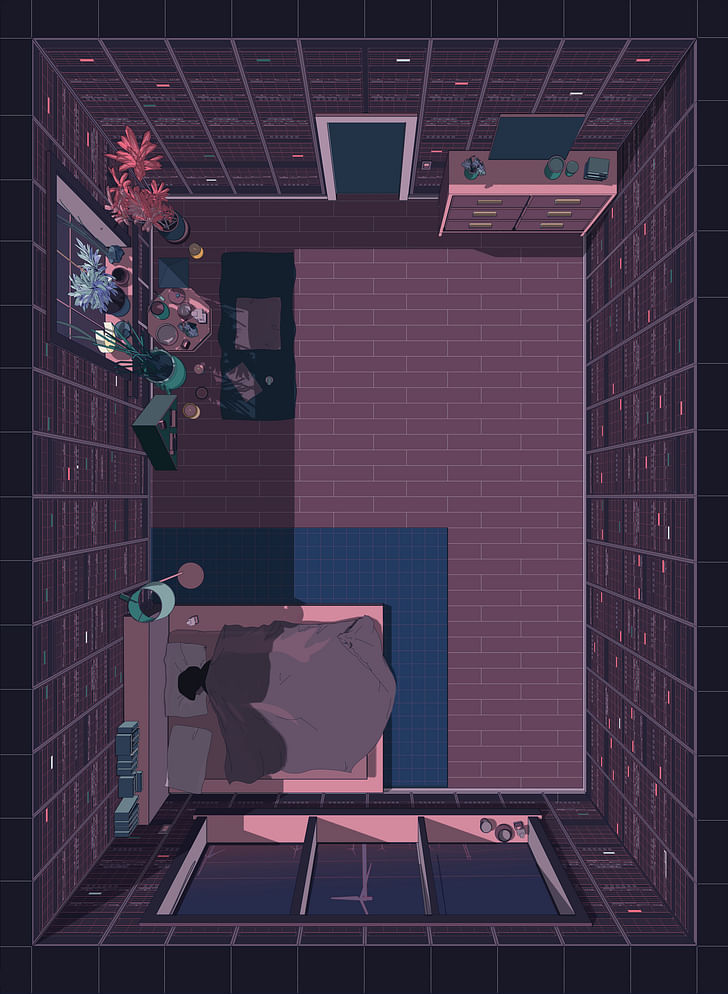

Data has become a commodity that influences the world of design. This week Archinect, connects with M.Arch graduate Rachel Chan who studied at the University of Toronto John H. Daniels Faculty of Architecture, Landscape, and Design. Chan's exploration of a data-driven world is given a comic-like visual narrative to question information's impact on culture and the physical world. Chan explains, "technology is coming to us much faster than our culture and ideologies are forming. How can we be better prepared to design for this future? [...] as the Internet’s presence becomes overwhelmingly significant and will require more mega structures to keep it online."
Archinect's Spotlight on 2020 Thesis Projects: 2020 has been an extraordinarily challenging year for architecture graduates. Students were displaced as schools shut down, academic communities had to adapt to a new virtual format, end-of-year celebrations were canceled or changed dramatically, and now these students are graduating into an extremely challenging employment market. To support the 2020 class we're launching a summer series of features highlighting the work of thesis students during this unique time of remote learning amid COVID-19. Be sure to follow our 2020 thesis tag to stay up to date as we release new project highlights.
Everyday Data envisions how data aesthetic and infrastructure will infiltrate our domestic lives both culturally and physically in our visionary future.
Please briefly describe your thesis
Everyday Data envisions how data aesthetic and infrastructure will infiltrate our domestic lives both culturally and physically in our visionary future. The internet continues to require an ever-growing network of physical data space – undersea cables, mega data centers, and so on – and an increasingly visible part of the rural landscape. If the internet is so prominent in our everyday lives, how can its infrastructure and aesthetic infiltrate our domestic lives both culturally and physically in the future?
Will data become the new sublime in settings where it can no longer hide in plain sight? Based off Neil Brenner’s Planetary Urbanism theory, the current continual growth of urban centers means that remoteness will ultimately be completely diminished. All territory is affected by urbanity and therefore, true “rural landscapes” will no longer exist, but only the “less urban.” This thesis investigates what this “less urban” territory will soon become as the Internet’s presence becomes overwhelmingly significant and will require more mega structures to keep it online. My approach on this visionary future is depicted through a comic that peers into a typical day of a data harvester.
This speculative narrative is an extrapolation of our real, data-driven world. In this time, we are surrounded by statistically proven gadgets and even food that allow us to maximize efficiency. Digital footprints define a personality. We remember our loved ones through their smartphone. The essence of one’s life is their clicks and views, all contained in a hard drive. Agricultural farms are converted to data center sites. Technology is coming to us much faster than our culture and ideologies are forming. How can we be better prepared to design for this future?
How did your project change as studios transitioned into remote learning?
I was fortunate enough to complete my thesis in December of 2019. However, having attended several of my peers’ Zoom reviews, I found that the online platform provided far greater accessibility as an audience. Some projects were also documented as a film or website, which gave projects an indefinite pin-up time, accessible whenever, unlike a physical pin up.
This wave of graduates will be first to design with a new set of challenges, which is pretty exciting.
Any tips for students working through their final projects?
While it is impossible to physically be immersed in a studio culture now, it is still virtually possible. Throughout the design and production stages, I found that my peers were very helpful in giving honest opinions, different perspectives, and moral support. It is easy to fall into a rabbit hole when working alone for long hours, and therefore important to check in from time to time. For the entirety of my graduate degree, I learned the most practical skills from my peers, whether that be Rhino commands or modeling techniques.
How do you feel about the architecture industry right now and job prospects?
Although the world seems to have come to a standstill in terms of the job market, I take this pause as an opportunity to learn and experiment with my personal skill set. It is the perfect time to learn a new program or pick up a hobby you never had time to commit to. Moreover, I also see this pandemic opening new doors to the design industry. This wave of graduates will be first to design with a new set of challenges, which is pretty exciting.
Katherine is an LA-based writer and editor. She was Archinect's former Editorial Manager and Advertising Manager from 2018 – January 2024. During her time at Archinect, she's conducted and written 100+ interviews and specialty features with architects, designers, academics, and industry ...
1 Comment
Beautiful drawings
Block this user
Are you sure you want to block this user and hide all related comments throughout the site?
Archinect
This is your first comment on Archinect. Your comment will be visible once approved.